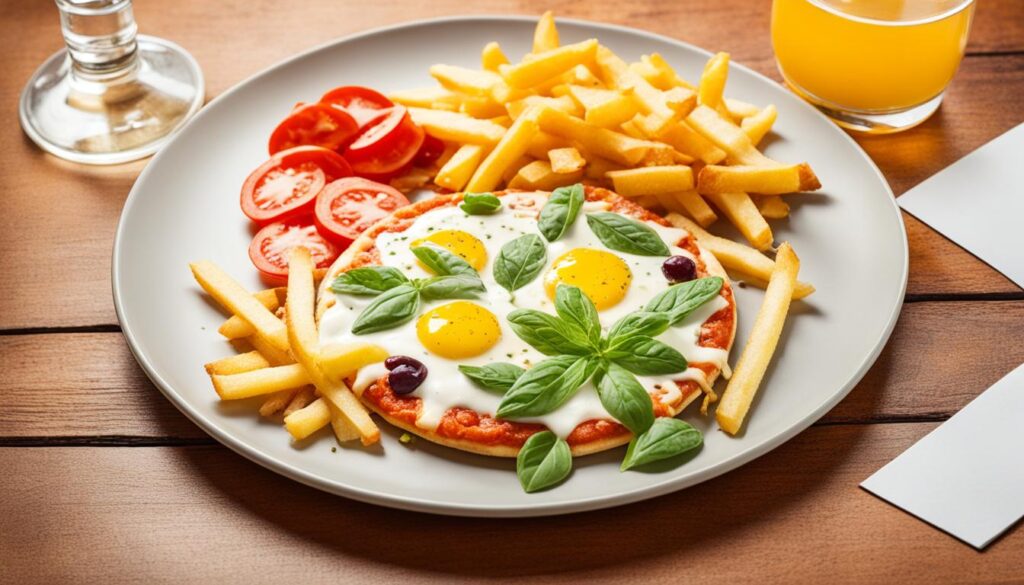Alcohol cravings can be tough for those in recovery. They can pop up suddenly and last a few minutes. It’s key to know how to handle them. This article will share practical strategies for managing these cravings. These strategies are important for reducing urges and improving your well-being.
Cravings are common early on in recovery and can stick around for years. They can be triggered by certain situations or feelings. These triggers can make recovery harder. Withdrawal symptoms can also make cravings worse, which is why getting help is important. Using different therapies, like changing your diet and practicing mindfulness, can help fight cravings. Remember, getting support from professionals is key to overcoming these challenges.
Next, we’ll look into why cravings happen, how food affects them, and ways to cope. We’ll also talk about how a strong support network is vital for recovery.
Key Takeaways
- Understanding the nature of alcohol cravings is essential for effective management.
- Implementing practical strategies can significantly reduce alcohol urges.
- Diet and nutrition play a vital role in regulating cravings.
- Professional help can provide necessary support during withdrawal.
- Building a supportive community is crucial in the recovery journey.
- Mindfulness and meditation techniques can aid in reducing cravings.
- Planning meals and activities can help divert attention from cravings.
Understanding Alcohol Cravings
Alcohol cravings are strong urges to drink, often triggered by stress, social settings, or certain foods. These feelings can be overwhelming, especially when starting to recover from alcohol addiction. In fact, intense cravings are a key sign of Alcohol Use Disorder, as the DSM-5 states.
- Internal triggers like random thoughts or physical sensations.
- Stressful situations that lead to discomfort.
- Social gatherings that revolve around drinking.
These triggers make recovery tough. But, research shows that mindfulness like yoga and meditation can help. These activities lessen the impact of cravings in both practice and everyday life.
Therapy, including shadow work, helps people deal with addiction-related issues. This healing process leads to better ways to handle cravings, giving more control over drinking urges.
Having a strong support system and planning ahead also helps with cravings. For over 80 years, Alcoholics Anonymous (AA) has offered support. It helps many recover by sharing experiences. Knowing cravings are temporary can help people get through them without giving in.
The Science Behind Alcohol Cravings
Exploring the science of alcohol cravings takes us into the depths of biology and genetics. The brain’s reward system is key in these cravings, changing brain chemistry to make alcohol tempting. This makes it hard for people to control their urge for alcohol.
Biological Processes Triggering Cravings
Alcohol changes how neurotransmitters work, especially dopamine, which is linked to feeling pleasure. When people drink, dopamine is released, making them want more. At first, alcohol can make people feel better by reducing stress and pain. But over time, this can lead to a cycle of cravings that makes fighting addiction harder.
Long-term alcohol use also harms the brain’s decision-making and memory skills. These are important for controlling cravings.
Genetic Factors Affecting Alcohol Cravings
Genetics play a big role in making some people more prone to cravings. Certain genes affect how alcohol is processed and its effects on the body. This can lead to stronger reactions to stress, making some turn to alcohol to cope.
Understanding how biology and environment interact helps us grasp the complex nature of alcohol cravings.
The Role of Diet in Alcohol Cravings
A well-balanced diet is key to managing alcohol cravings. Knowing how nutritional gaps can make cravings worse helps in finding ways to reduce them. Certain nutrients can also help keep the brain chemistry healthy, which affects mood and cravings.
How Nutritional Deficiencies Contribute
Research links nutritional deficiencies to more alcohol cravings. Not having enough vitamin B6 makes people more likely to crave alcohol. Omega-3 fatty acids in foods like salmon and walnuts can also lessen these cravings. A diet without these nutrients can mess with how neurotransmitters work, leading to cravings.
Foods That Support Healthy Brain Chemistry
Eating foods rich in nutrients can boost mental health. Foods that help with healthy brain chemistry include:
- High-Protein Foods: Lean meats and legumes keep blood sugar stable, which helps fight cravings.
- Whole Grains: Quinoa and oats give you energy and prevent blood sugar highs that lead to cravings.
- Antioxidant-rich Fruits and Vegetables: Berries and leafy greens cut down on oxidative stress and boost brain health.
- Fermented Foods: Yogurt and sauerkraut are good for gut health and mood, helping to control cravings.
- Dark Chocolate: It can make you feel better and might reduce cravings.
It’s also important to stay hydrated, as not drinking enough water can make you crave more. Drinking water all day can help tell the difference between thirst and cravings.
Fixing nutritional deficiencies through food choices helps both your body and mind. Eating a balanced diet is key to feeling emotionally well and cutting down on alcohol use. For more tips on how to improve mental health, check out this resource.
Coping Techniques for Alcohol Cravings
Learning how to deal with alcohol cravings is key for those starting a journey to sobriety. It’s important to see these cravings as something that will pass. Using the right coping strategies can help you handle urges better. Distraction is a big part of getting through tough cravings.
Acknowledging the Craving
It’s crucial to recognize when you’re craving alcohol. These cravings can come from things like:
- People: friends, family, coworkers
- Places: bars, restaurants, bathrooms
- Objects: drug paraphernalia or any items associated with alcohol consumption
Other things can also make you want to drink more. For example, stressful times, happy events, or being around alcohol can make it harder to resist. Feeling sad or happy can also make cravings worse.
Distraction Techniques to Manage Urges
When cravings hit, distraction is key. Here are some ways to distract yourself:
- Engage in enjoyable hobbies.
- Reach out to supportive friends or family members.
- Practice mindfulness or meditation to regain focus.
- Exercise regularly to boost endorphins and improve mood.
- Maintain a daily journal, reflecting on gratitude and experiences.
Don’t give in to cravings right away. They usually go away after 30 to 45 minutes. Using the ABC technique can help you deal with thoughts that might make you want to drink.

Using these strategies for dealing with alcohol cravings will help you get through tough times. It makes it easier to stay on the path to recovery.
Expert Tips on Overcoming Alcohol Cravings
Overcoming alcohol cravings can be tough, but expert tips can help a lot. First, learn what triggers your cravings. This helps you make plans to handle them better.
Identifying Triggers in Your Environment
Cravings usually last 15 to 20 minutes. It’s key to focus on something else during this time. Triggers can be social events, feelings, or places linked to drinking. Using mindfulness helps you see your cravings without judging them.
This approach helps you understand what causes your cravings. It lets you take steps to avoid them later. For more info on alcohol and anxiety, check out this resource.
Strategies to Build a Supportive Network
Having a supportive network is key to beating cravings and staying sober. Join recovery groups, see a therapist, or hang out with people who get what you’re going through. This builds a strong support system.
Doing team sports is great for staying busy and making friends. Setting and hitting goals helps keep you on track. And don’t forget, getting help from professionals can make it easier to overcome cravings.
| Trigger Type | Response Strategy |
|---|---|
| Social Situations | Avoid places where alcohol is present, or attend with a supportive friend. |
| Emotional Triggers | Practice mindfulness and engage in journaling to explore feelings. |
| Boredom | Find new hobbies or join activities to keep occupied. |
| Stress | Engage in physical activity or meditation to alleviate stress levels. |
Practical Strategies for Managing Alcohol Cravings
Handling alcohol cravings can feel tough, but there are steps you can take to get back in control. Setting clear drinking goals helps guide you. Meal planning can also stop cravings from getting the best of you.
Setting Clear Drinking Goals
It’s crucial to set clear drinking goals to fight cravings. Start with specific, measurable, achievable, relevant, and time-bound (SMART) goals. This could mean not drinking for certain days or limiting your drinks on specific days. Keeping track of your drinking can make you more accountable and show your progress.
Setting realistic goals is key to staying motivated. Aim for slow changes rather than big cuts.
Meal Planning to Curb Cravings
Meal planning is key in managing alcohol cravings. Well-planned, nutritious meals can lower the chance of cravings. Focus on foods high in protein, fiber, and healthy fats to keep your blood sugar stable and make you feel full. A planned menu can also stop you from drinking on a whim because you’re hungry or craving.
Here are some tips for meal planning:
- Prepare meals ahead to avoid unhealthy, last-minute choices.
- Add a mix of colorful fruits and vegetables for a balanced diet.
- Drink water all day to stay hydrated, as thirst can feel like cravings.
Effective Ways to Conquer Alcohol Cravings
Managing alcohol cravings can be tough, but some strategies can help a lot. Mindfulness and meditation, along with a balanced diet, are key. These methods help with cravings and boost your mental and physical health.
Utilizing Mindfulness and Meditation
Mindfulness and meditation are great for beating alcohol cravings. They make you more aware of your feelings and body signals. By staying in the moment, you can handle cravings better. Just a few minutes of meditation each day can make you stronger against cravings, leading to healthier choices.
Adopting a Balanced Nutrition Plan
Eating well is crucial for managing your mood and energy, which affects cravings. Foods full of nutrients can change your brain chemistry, making cravings less likely. Vitamins and minerals help with recovery and overall health. Eating meals with whole grains, lean proteins, fruits, and veggies is key to controlling cravings.
| Food Type | Benefits for Cravings |
|---|---|
| Whole Grains | Provide sustained energy and regulate blood sugar levels. |
| Lean Protein | Supports muscle repair and keeps you feeling full longer. |
| Fruits & Vegetables | Rich in vitamins and minerals that enhance mood and overall health. |
| Nuts & Seeds | Offer healthy fats that improve brain function and reduce cravings. |
Using these strategies helps with both your mind and body, making a lasting change towards sobriety. For more on emotional challenges, check out the importance of professional help.
Strategies to Beat Alcohol Cravings
Managing alcohol cravings often means making lifestyle changes. Two key strategies are staying hydrated and exercising regularly. These methods help you fight the urge to drink and boost your health.
Hydration and Its Impact on Cravings
Drinking enough water is key to fighting off cravings. It helps ease physical symptoms like dryness and tiredness that can make you want to drink. Drinking water often can lessen these feelings, making it easier to stay away from alcohol.
Adding hydration to your daily life is a step towards a healthier choice. It helps you focus more on staying sober.
Regular Exercise as a Distraction
Exercise is a great way to distract yourself from cravings. Activities like cycling or running can lift your mood and energy levels. They also cut down on cravings.
A study in Drug and Alcohol Dependence found that a short workout reduced alcohol cravings. This shows how exercise helps both your mind and body in staying sober.
Using strategies like staying hydrated and exercising can help you stay sober. Making these changes is a big step towards a healthier life without alcohol. For more on how to manage anxiety without drugs, check out this article. It talks about ways to improve your mental health and fight cravings.
| Strategy | Benefits | Implementation Tips |
|---|---|---|
| Hydration | Reduces physical symptoms, promotes clarity | Carry a water bottle, set reminders to drink |
| Exercise | Boosts mood, decreases cravings | Choose enjoyable activities; aim for consistency |
Techniques for Curbing Alcohol Urges
Curbing alcohol urges needs proactive steps and careful planning. Starting with alcohol-free days is key. It helps break the cycle of drinking. Doing other things can also help reduce cravings.
Creating Alcohol-Free Days
Setting aside days without alcohol is a good first step. Start with one or two days a week and increase as you get better. This helps fight cravings and leads to healthier choices.
Engaging in Alternative Activities
It’s important to find fun things to do instead of drinking. Here are some ideas:
- Join a hobby group or class, such as painting, cooking, or dancing.
- Participate in outdoor sports like hiking, cycling, or swimming.
- Volunteer at local community centers or charities.
- Go to local events or festivals that focus on healthy living.
- Try mindfulness meditation, which can help reduce cravings.
Using these techniques for curbing alcohol urges can make life more fulfilling. Keeping a list of fun activities can remind you of the good times without drinking.
| Activity | Benefits |
|---|---|
| Hobby Classes | Promotes creativity and social interaction |
| Outdoor Sports | Improves physical health and boosts mood |
| Volunteering | Offers a sense of purpose and connection |
| Local Events | Encourages community engagement and fun |
| Mindfulness Meditation | Improves focus and reduces anxiety |
Adding alcohol-free days and alternative activities to your life helps fight cravings. Every step towards a healthier life moves you closer to recovery.
The Connection Between Food and Alcohol Cravings
The link between food and alcohol cravings is key in recovery. Eating well helps keep blood sugar stable, which can lower alcohol cravings. Some foods can directly affect cravings, making it vital to know how diet impacts cravings.
Adding a variety of nutrient-rich foods to meals helps the body handle stress better. This can cut down on cravings for both food and alcohol. Foods like lean meats, legumes, and tofu help the brain and mood. Healthy fats in avocados and nuts make you feel full, reducing the need for alcohol.
Knowing how nutritional impact on recovery works also means seeing how not having enough vitamins B and D can make stress and anxiety worse. This might lead people to turn to alcohol for comfort. Keeping an eye on what we eat helps with recovery and boosts overall health.

It’s important to plan meals for steady energy all day. This helps fight off the urge to drink by keeping energy levels up without the drop from sugary foods. Whole grains and fibrous veggies are good for a balanced diet.
Looking into how food and alcohol cravings are linked shows how making smart food choices can help in recovery. By focusing on nutrition, people can make lasting changes. This keeps both physical and emotional health strong as they move towards sobriety.
Incorporating Beneficial Foods into Your Diet
Eating foods that are good for you every day can really help with recovery. A diet full of high-protein foods and lots of fruits and vegetables keeps your energy steady and your mood stable. This balanced diet helps you heal faster and reduces cravings.
High-Protein Foods That Satisfy
High-protein foods are key for getting better. They help fix tissues and keep muscle mass strong. These foods also stop cravings by giving you energy that lasts and making you feel full. Here are some top high-protein foods:
- Lean meats such as chicken and turkey
- Fish rich in omega-3 fatty acids, including salmon and mackerel
- Legumes like lentils and chickpeas
- Dairy products such as Greek yogurt and cottage cheese
- Eggs, which are versatile and highly nutritious
Fruits and Vegetables to Maintain Balance
Eating a lot of fruits and vegetables is very important for your health. These foods are full of vitamins, minerals, and antioxidants. They help keep your brain healthy and your mood stable. They also fix nutrient gaps that can happen when you’re recovering. Here are some great choices:
| Fruits | Health Benefits |
|---|---|
| Berries (blueberries, strawberries) | Rich in antioxidants, they help reduce inflammation and improve brain function. |
| Bananas | Provide potassium and vitamin B6, supporting nerve function and mood. |
| Oranges | High in vitamin C, they aid in immune function and enhance mood. |
| Leafy Greens (spinach, kale) | Packed with minerals like calcium and magnesium, essential for brain health. |
| Cruciferous Vegetables (broccoli, Brussels sprouts) | Contain compounds that may help reduce inflammation and support mood control. |
Resources for Managing Alcohol Cravings
There are many ways to help manage alcohol cravings. These include professional help, community support, and self-help methods. Knowing what’s out there can help you on your path to recovery.
Support Groups and Professional Help
Support groups like Alcoholics Anonymous or SMART Recovery offer a community for those fighting cravings. They let you share stories and get support, showing you’re not alone. Professional help is also key, with therapies like cognitive-behavioral therapy to change negative thoughts about drinking.
Other therapies, like motivational enhancement and mindfulness, help you resist cravings. These methods are important for overcoming addiction.
Self-Help Techniques and Guides
Using self-help techniques can really help reduce cravings. Mindfulness meditation helps you notice cravings but not act on them. Writing about your cravings and triggers can help you understand yourself better.
Drinking water can also help you tell thirst from the urge to drink alcohol. Doing fun activities can distract you from cravings too. These strategies are part of managing alcohol cravings.
| Resource Type | Description | Example |
|---|---|---|
| Support Groups | Community connections providing encouragement and shared experiences. | Alcoholics Anonymous |
| Professional Help | Therapeutic support from licensed specialists to address addiction. | Cognitive-behavioral therapy |
| Self-Help Techniques | Individual strategies to manage cravings through personal efforts. | Mindfulness meditation |
| Guides and Literature | Books and manuals offering structured approaches to recovery. | The Recovery Book |

Importance of Support Systems in Recovery
The journey to recovery is tough, but having support is key. Making friends with others who are recovering helps a lot. They offer emotional support, share similar experiences, and give encouragement.
This creates a community that keeps people motivated to keep recovering.
Building Connections with Other Recovering Individuals
Connecting with people who know what you’re going through can really help. Being in group therapy is a great way to deal with addiction. It cuts down on substance use and helps with social skills.
Peer support groups give real advice and emotional support. They make it easier to handle tough times in recovery.
Family and Friends as Supportive Allies
Family support is crucial for those fighting addiction. It gives a steady base for recovery. Friends and family can lift your spirits and keep you going when it’s hard.
Research shows a strong support system helps fight shame and hopelessness. This is good for your mental health and overall happiness. Regular chats and support from loved ones help you stay on track with sobriety.
Need Help From Professionals? Understand Your Options
Getting help from professionals is often a key step for those dealing with alcohol cravings. In the U.S., about 29.5 million people face alcohol use disorder (AUD). This shows how big of a public health issue it is. Knowing about treatment options can help people on their path to recovery.
There are many ways to get professional help. You can choose inpatient programs for constant care or outpatient services that let you keep up with daily life. Counseling is also key, helping people find ways to cope and deal with deep-seated issues that lead to cravings.
Also, holistic methods like mindfulness and wellness can really help. For example, Project 90 has a 98% success rate in helping people stay off alcohol for 90 days straight. This shows how effective some treatments can be. Plus, some people might get tax breaks, making getting help easier on the wallet.
It’s clear that drinking too much alcohol is bad for our health, leading to many health problems. Getting help for alcohol cravings through structured treatments can really boost your chances of getting better. It also makes you feel better overall.
Conquering Alcohol Cravings: Practical Strategies
Understanding the complexities of addiction is key to beating alcohol cravings. Many people can live healthier lives without alcohol with the right support and effort. In 2014, only 6.7% of adults with Alcohol Use Disorder got treatment. This shows we need better ways to help more people seek help.
Family, friends, and groups like Alcoholics Anonymous are vital in recovery. They offer emotional support and help people stay on track. Getting professional help that fits your needs also makes a big difference.
Learning about addiction can change how you see it. Seeing it as a disease, not a personal failure, helps reduce shame. This makes people more likely to get help without fear of being judged.
To recover, you need to be active and committed. Look for places where you can talk openly, know what triggers you, and join self-help groups. These steps help you find better ways to deal with problems, leading to a life without alcohol.
| Strategy | Description |
|---|---|
| Support Groups | Provides a safe space for sharing experiences and fosters a sense of community. |
| Professional Counseling | Offers individualized strategies and coping techniques based on specific needs. |
| Self-Education | Increases awareness and understanding of addiction, reducing stigma. |
| Goal Setting | Encourages individuals to define clear, achievable objectives for their recovery journey. |
Beating alcohol cravings takes support, knowledge, and practical steps. Working together to improve mental health can help people on their journey to sobriety. For more tips on emotional health, check out self-care strategies that can enrich your recovery.
Conclusion
This conclusion wraps up our talk on managing alcohol cravings. It shows many ways to help people deal with alcohol. Addiction touches many lives, so it’s key to know what triggers cravings. We’ve shared tips on nutrition, coping, and the power of support groups.
Understanding how habits work is also important. Things like Cognitive-Behavioral Therapy and support groups like Alcoholics Anonymous can really help. Remember, setbacks happen, but they don’t mean you’ve failed. They show you’re still on the path to recovery.
Beating alcohol cravings means making changes in your life. Stress less and stay active to fight cravings and support your recovery. With hard work, support, and lasting changes, beating alcohol addiction is possible.


